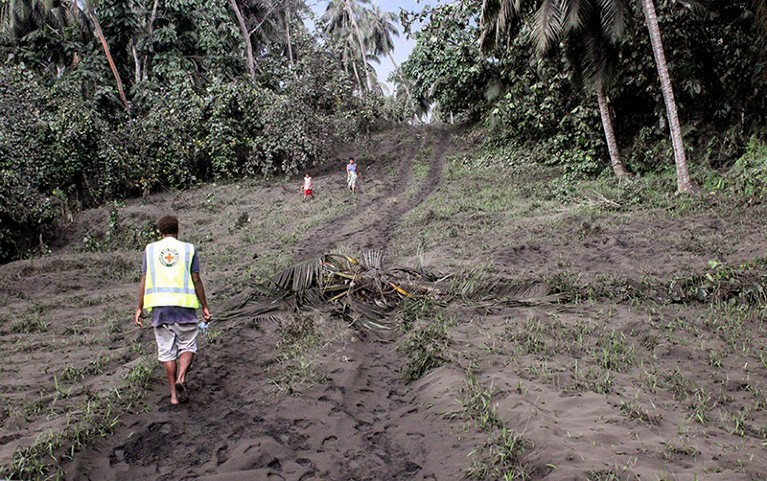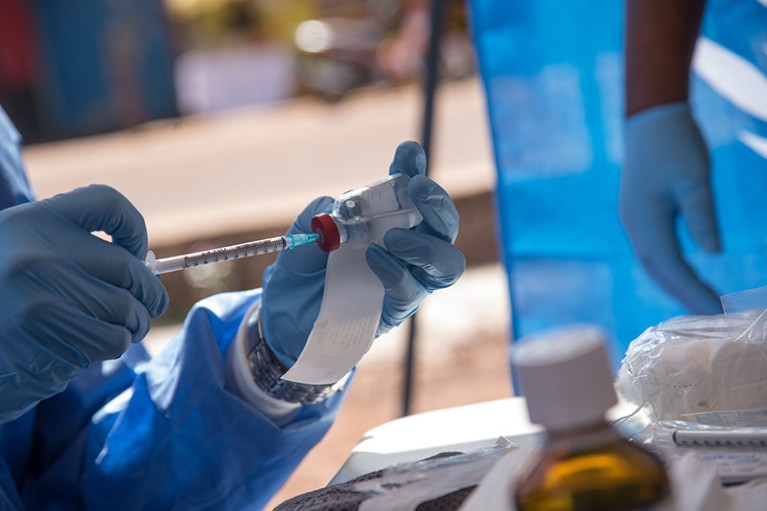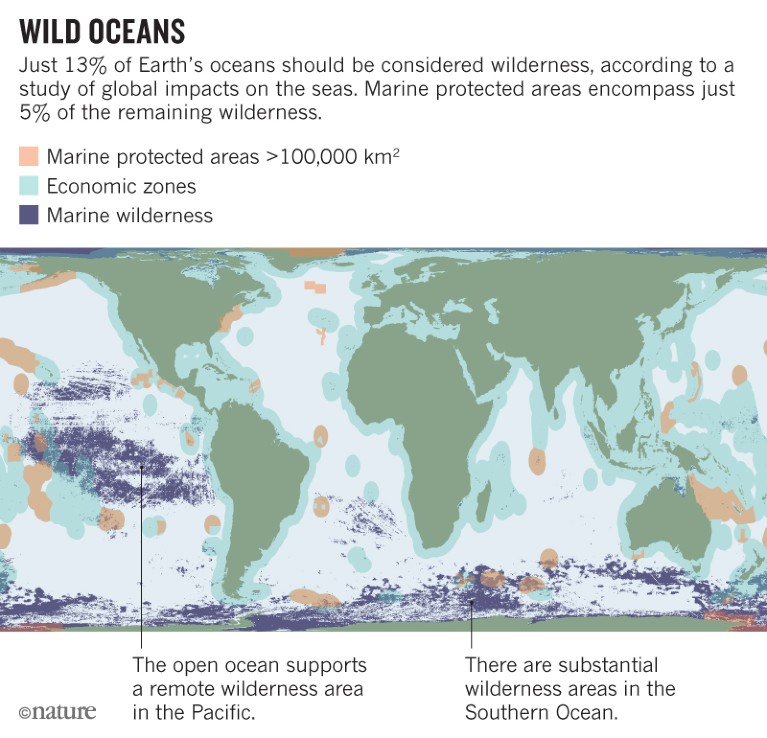EVENTS
Volcanic eruption prompts evacuation The Vanuatu government ordered all 11,000 residents of Ambae island to evacuate on 27 July because of the erupting Manaro Voui volcano. Ash plumes have risen more than 5 kilometres, darkening the sky and making travel difficult as people prepared to move to neighbouring islands. The Vanuatu meteorology and geo-hazards department warned of the health risks of breathing volcanic ash and gas. Manaro Voui is the most voluminous volcano in the South Pacific’s New Hebrides archipelago, and an eruption last September forced an island-wide evacuation then, too. It has continued to sporadically belch out ash, triggering several partial evacuations earlier this year.

An ash-covered forest road on Vanuatu’s Ambae Isle.Credit: Vanuatu Red Cross via EPA
RESEARCH
Ketamine trial A consumer-advocacy group filed a complaint with the US government on 25 July about two clinical trials in Minnesota that allegedly gave agitated patients ketamine and other sedatives without their consent and despite evidence that doing so could harm their health. Researchers at Hennepin County Medical Center (HCMC) in Minneapolis conducted the trials between 2014 and June 2018. The advocacy group, Public Citizen of Washington DC, submitted the complaint to the US Office for Human Research Protections and the Food and Drug Administration. Sixty-four doctors, bioethicists and academic researchers co-signed the group’s letter. A spokesperson for Hennepin Healthcare, which operates the HCMC, declined to comment on the studies until after ongoing internal and external investigations are complete.
Embryo editing Most US adults think that it would be appropriate to use gene editing on human embryos to reduce the risk of developing a serious disease, according to a survey of 2,537 people released on 26 July. The survey, conducted by the Pew Research Center in Washington DC, found that religion had a strong influence on responses. Almost three-quarters of those who reported low levels of religious commitment supported gene editing in embryos to reduce the risk of disease later in life, compared to only 46% of those with high religious commitment. On average, men were more supportive than women of gene editing in embryos, and people with high levels of science knowledge were more comfortable with the idea than were those with less. Only 19% of respondents thought it appropriate to use gene editing to improve intelligence.
Stem-cell advance Doctors in Japan are poised to implant neural cells made from ‘reprogrammed’ stem cells into people with Parkinson’s disease. It is only the third clinical application of induced pluripotent stem (iPS) cells, which are developed by inducing the cells of body tissues such as skin to revert to an embryonic-like state, from which they can morph into other cell types. Researchers have used the technique to generate precursors to cells that make the neurotransmitter dopamine, which degenerate and die in people with Parkinson’s disease. Physicians at Kyoto University Hospital will inject 5 million of these precursor cells into the brains of seven people with the condition. Because dopamine-producing neurons are involved in motor skills, people with the condition typically experience tremors and stiff muscles. Participants will be observed for two years after the transplantation. One of the trial’s leaders, stem-cell scientist Jun Takahashi at the Center for iPS Cell Research and Application in Kyoto, demonstrated in 2017 that the therapy improved symptoms in monkeys that had a version of the disease (T. Kikuchi et al. Nature 548, 592–596; 2017).
FACILITIES
Telescope boon A French consortium has become the twelfth member of the Square Kilometre Array (SKA), an effort to build the world’s largest radio telescope. The SKA will eventually consist of thousands of radio dishes in Africa and up to 1 million in Australia; construction is expected to begin in 2020. Last year, the coordinating organization scaled back its design for the first phase of the SKA to keep it within a cost cap of €674 million (US$790 million). Project leaders hope that the addition of members, who pay an undisclosed fee, will allow for construction of the original design. Spain joined the effort in June. The Maison SKA-France consortium is the first public–private group to join the SKA and is headed by the country’s largest research agency, the CNRS. The consortium includes four other research organizations and seven private companies. The SKA’s other members comprise 11 nation states, including China and India.
HEALTH
Ebola outbreak ends An outbreak of the Ebola virus that began in the Democratic Republic of the Congo (DRC) in early May was declared over by the country’s health ministry on 24 July. A total of 54 people were infected, 33 of whom died. The outbreak was centred in remote rural regions of the northwestern Équateur Province, but cases were also reported in Mbandaka, a city on the banks of the Congo River, a major transport route. That prompted fears that the disease could spread quickly both in the city and to other regions. The outbreak is the DRC’s ninth; the first known outbreak of Ebola virus occurred in the nation in 1976. Learning from mistakes in the large 2014–16 Ebola epidemic in West Africa, international public-health bodies quickly gave the DRC support — including helping to deploy several thousand doses of an experimental Ebola vaccine (pictured).

An experimental vaccine was rolled out early in the latest Ebola outbreak in the Democratic Republic of the Congo.Credit: Junior D. Kannah/AFP/Getty
Fetal trial stopped A clinical trial in the Netherlands designed to test whether sildenafil (Viagra) could treat a fetal growth condition has been cancelled after an interim assessment found that the therapy caused harm. The randomized trial treated 90 pregnant women with sildenafil and 93 with a placebo. Seventeen fetuses in the treatment group developed a severe lung disease and 11 of them died from the disease; only 3 fetuses in the control group developed the lung disease, and none of them died (fetuses in both groups also died from causes other than the lung disease). The growth condition is caused by insufficient blood oxygen and nutrient supply through the placenta, and carries a high risk of fetal death or of brain damage in surviving babies. Researchers had hoped that sildenafil would dilate blood vessels in the placenta and improve fetal growth. The scientists running the trial notified Canadian researchers conducting a similar study, who have temporarily stopped their research.
PEOPLE
University lawsuit The latest in a string of lawsuits filed against the University of Southern California (USC) in Los Angeles claims that the university “suppressed and concealed” years of sexual-harassment complaints against former gynaecologist George Tyndall. The complaints from former and current students span nearly three decades, and include allegations that Tyndall “perpetrated serial sexual abuse, harassment, molestation, and violation”, according to one of the lawsuits filed on 23 July. After an internal investigation in 2016, the USC suspended Tyndall with pay, and he retired in 2017. California’s Department of Education is currently investigating the university’s response to the complaints. In a statement to Nature, the USC says that it will seek a “prompt and fair resolution that is respectful of our former students”. Nature’s attempts to reach Tyndall and his lawyer were unsuccessful.
POLICY
Trial reporting The US National Institutes of Health (NIH) has postponed enforcement of a controversial rule that would have required behavioural studies to register as clinical trials. In a 20 July announcement, the agency said that until 24 September 2019, researchers performing basic trials with human participants would not be penalized for failing to list their studies on the government database ClinicalTrials.gov. Brain and behavioural scientists had pushed back against clinical-trial reporting policy that the NIH announced in 2016, which held non-invasive studies — such as cognitive tests and brain scans — to the same standards as drug trials. Numerous researchers argued that these rules were too burdensome and confusing. In its latest announcement, the NIH asked scientists to submit suggestions of how to make the policy more appropriate for basic research.
TREND WATCH
Only 13% of Earth’s oceans can now be classed as wilderness, according to a 26 July study (K. R. Jones et al. Curr. Biol. https://doi.org/csh5; 2018). Researchers used global data on 15 human stressors of oceans, including fishing, pollution and commercial shipping. Areas were defined as wilderness if they showed little impact from these stressors (scoring in the bottom 10% of a measure of each), as well as a low aggregate score that combined these human activities and climate stresses such as ocean acidification. Most wilderness areas are in the open ocean and around the poles, far from human populations. Coastal ecosystems — which include centres of biodiversity such as coral reefs — make up just 10% of the wilderness area. Of all marine wilderness, just 5% is covered by marine protected areas. “High seas at the moment are a Wild West,” says author Kendall Jones, a conservation biologist at the University of Queensland in Brisbane, Australia. “It really highlights that those last few areas that are not impacted — how important they are.” The United Nations is debating a high-seas conservation treaty, which should be signed by 2020.

Source: K. R. Jones et al. Curr. Biol. https://doi.org/csh5 (2018)



